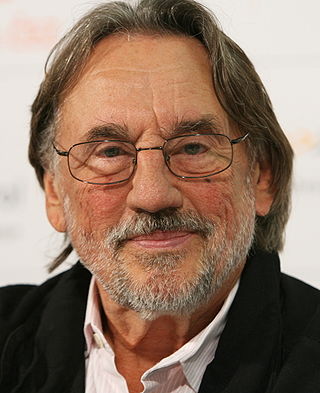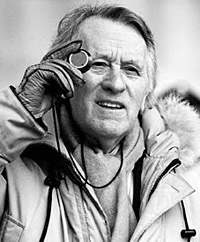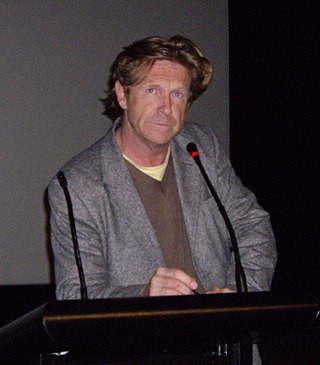
Conrad Lafcadio Hall, ASC was a French Polynesian-born American cinematographer. Named after writers Joseph Conrad and Lafcadio Hearn, he became widely prominent as a cinematographer earning numerous accolades including three Academy Awards, three BAFTA Awards and five American Society of Cinematographers Awards.

Vilmos Zsigmond was a Hungarian-American cinematographer. His work in cinematography helped shape the look of American movies in the 1970s, making him one of the leading figures in the American New Wave movement.
Ted Moore, BSC was a South African-British cinematographer known for his work on seven of the James Bond films in the 1960s and early 1970s. He won the Academy Award for Best Cinematography for his work on Fred Zinnemann's A Man for All Seasons, and two BAFTA Awards for Best Cinematography for A Man for All Seasons and From Russia with Love.

Frederick William FrancisBSC was an English cinematographer and film director whose filmmaking career spanned over 60 years, from the late 1930s until the late 2000s. One of the most celebrated British cinematographers of his time, he received numerous accolades for his photography, including two Academy Awards and five BAFTA Awards. As a director he was best known for his horror films, notably those made for production companies Amicus and Hammer in the 1960s and 1970s.
Frederick A. YoungOBE, BSC was an English cinematographer. Sometimes credited as F. A. Young, his career in motion picture photography spanned more than 130 films across nearly 70 years, between 1919 and 1984. He was best known for the sweeping, lush widescreen color photography he displayed through his collaborations with director David Lean. He won the Academy Award for Best Cinematography three times - for Lawrence of Arabia (1962), Doctor Zhivago (1965) and Ryan's Daughter (1970) - all directed by Lean.

Denis John “Jack” HildyardBSC was a British cinematographer who worked on more than 80 films during his career.
Christopher George Joseph Challis BSC, FRPS was a British cinematographer who worked on more than 70 feature films from the 1940s onwards.

Guy Mervin Charles Green OBE BSC (5 November 1913 – 15 September 2005) was an English film director, producer, screenwriter, and cinematographer. In 1948, he won an Oscar as cinematographer for the film Great Expectations. In 2002, Green was given a Lifetime Achievement Award by the BAFTA, and, in 2004, he was named an Officer of the Order of the British Empire for his lifetime contributions to British cinema.
William Ashman Fraker, A.S.C., B.S.C. was an American cinematographer, film director and producer. He was nominated five times for the Academy Award for Best Cinematography. In 2000, he received a Lifetime Achievement Award from the American Society of Cinematographers (ASC) honoring his career. Fraker graduated from the USC School of Cinematic Arts in 1950.
Walter C. Pfister is an American director and former cinematographer, who is best known for his work with filmmaker Christopher Nolan. Some of his collaborations with Nolan include Memento (2000), The Dark Knight Trilogy (2005–2012), and Inception (2010). For his work on Inception, Pfister won an Academy Award for Best Cinematography and received a BAFTA Award nomination.
Remi Adefarasin is an English cinematographer. He is educated in Photography & Filmmaking at Harrow Technical College. He started his career as a camera trainee at BBC-TV's Ealing Studios. His work on Elizabeth (1998) won him awards for Best Cinematography from BAFTA and the British Society of Cinematographers, as well as a "Golden Frog" from Camerimage and an Academy Award nomination. For his work on Elizabeth, he became the first black person to be nominated for the Academy Award for Best Cinematography.
Jordan Scott Cronenweth, ASC was an American cinematographer based in Los Angeles, California. Considered to be one of the greatest and most influential cinematographers of all time, he is best remembered for his BAFTA Award-winning work on the groundbreaking science fiction film Blade Runner, which is credited as codifying the cyberpunk aesthetic. A contemporary of Conrad Hall, his style consisted of heavily textured, film noir-inspired photography, seen in numerous classic films, including Zandy's Bride, Gable and Lombard, Altered States, and Peggy Sue Got Married.

John Alcott, BSC was an English cinematographer known for his four collaborations with director Stanley Kubrick: 2001: A Space Odyssey (1968), for which he took over as lighting cameraman from Geoffrey Unsworth in mid-shoot, A Clockwork Orange (1971), Barry Lyndon (1975), the film for which he won his Oscar, and The Shining (1980). Alcott died from a heart attack in Cannes, France, in July 1986; he was 55. He received a tribute at the end of his last film No Way Out starring Kevin Costner.
Gerry Fisher, B.S.C. was an English cinematographer.

Anthony Dod Mantle, DFF, BSC, ASC is a British cinematographer and still photographer.
Oswald Norman Morris, BSC was a British cinematographer. Known to his colleagues by the nicknames "Os" or "Ossie", Morris's career in cinematography spanned six decades.
Anthony Barry Richmond BSC, ASC is an English cinematographer, film producer, and director. He is known for his collaborations with Nicolas Roeg, which include Don't Look Now (1973), The Man Who Fell to Earth (1976), and Bad Timing (1980). He was the cinematographer for the 10-camera filming of the final Beatles film Let It Be (1970), the original footage from which was re-edited by Peter Jackson into the highly acclaimed docu-series The Beatles: Get Back (2021). For his work on Don't Look Now, Richmond received the 1973 BAFTA for Best Cinematography. His other notable credits include the cult horror films Candyman (1992), Tales from the Hood (1995), Ravenous (1999), and Cherry Falls (2000), as well as mainstream comedies such as Legally Blonde (2001) and The Sweetest Thing (2002). His sole directorial credit is the 1985 drama Déjà Vu.
Daniel Cohen is an English cinematographer. A member of the British Society of Cinematographers, he has worked on many feature films and television series, and is known for his collaborations with Tom Hooper, Stephen Frears, Shane Meadows, and Lenny Abrahamson. He has worked with Hooper on five occasions: Longford (2006), John Adams (2008), The King's Speech (2010), Les Misérables (2012), and The Danish Girl (2015). He was nominated for the Academy Award for Best Cinematography for The King's Speech, the BAFTA Award for Best Cinematography for Les Miserables, and the Primetime Emmy Award for Outstanding Cinematography for a Limited Series for John Adams.

Martin Kenzie was a British second unit director and cinematographer whose works include feature films such as The Shining (1980), Return of the Jedi (1983), Aliens (1986), The King's Speech (2010) and TV series including Rome (2005) and Game of Thrones (2012). He was a member of the British Society of Cinematographers as a Camera Operator and was later elected a "Full Member of the Society" with BSC accreditation in 2012. Kenzie was diagnosed with cancer and was being operated on with the help of Macmillan Cancer Support. He died on 16 July 2012 at the age of 56. The Game of Thrones season three premiere episode, "Valar Dohaeris", aired on 31 March 2013, was dedicated to the memory of Kenzie in the credits.
Brian Richard TufanoBSC was an English cinematographer, best known for his work on the films of Danny Boyle and Menhaj Huda. Tufano was admitted to the British Society of Cinematographers and won the 2001 BAFTA Award for Outstanding Contribution to Film and Television. His most well-known works include Trainspotting, A Life Less Ordinary and Billy Elliot.







